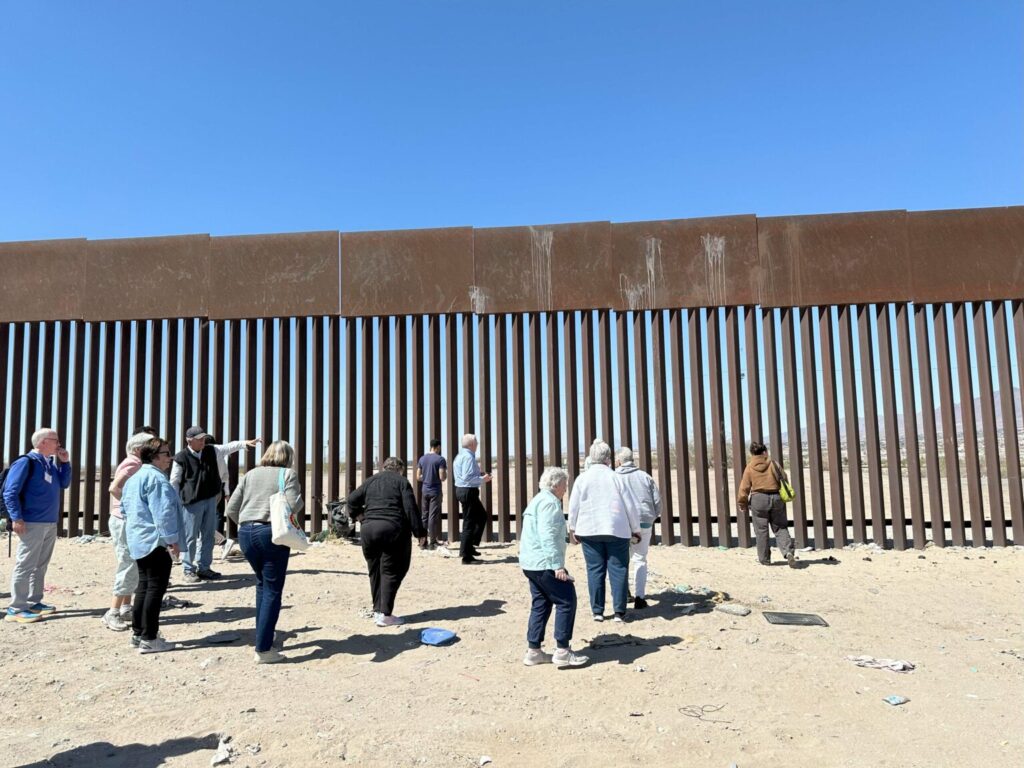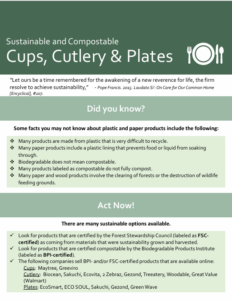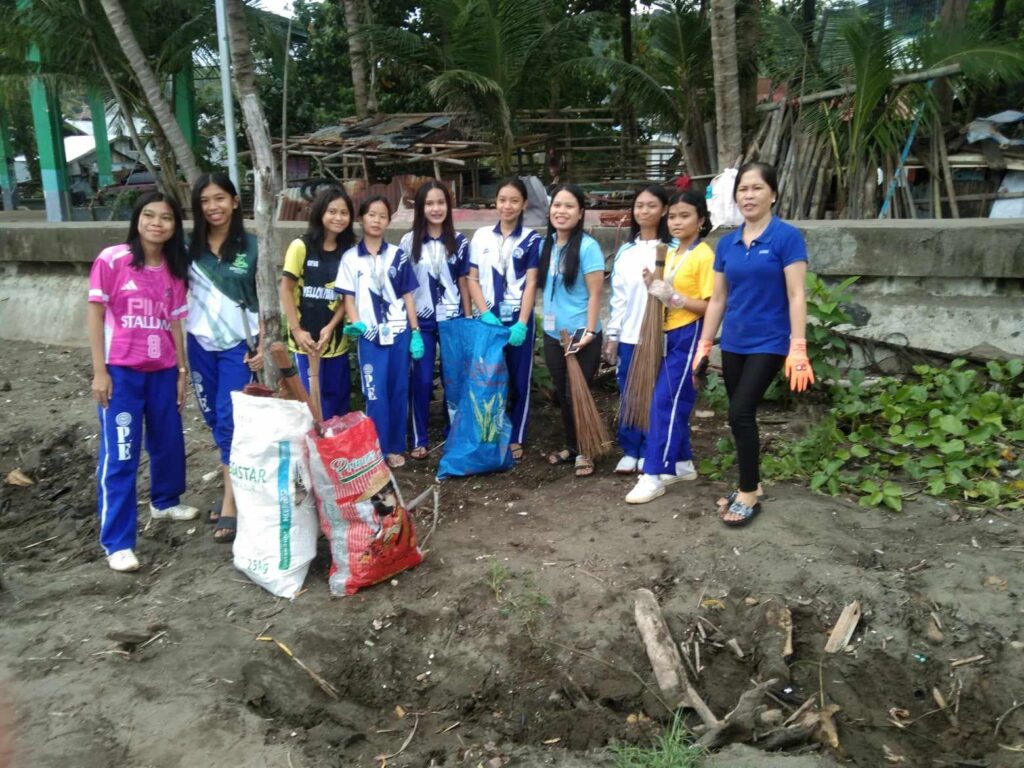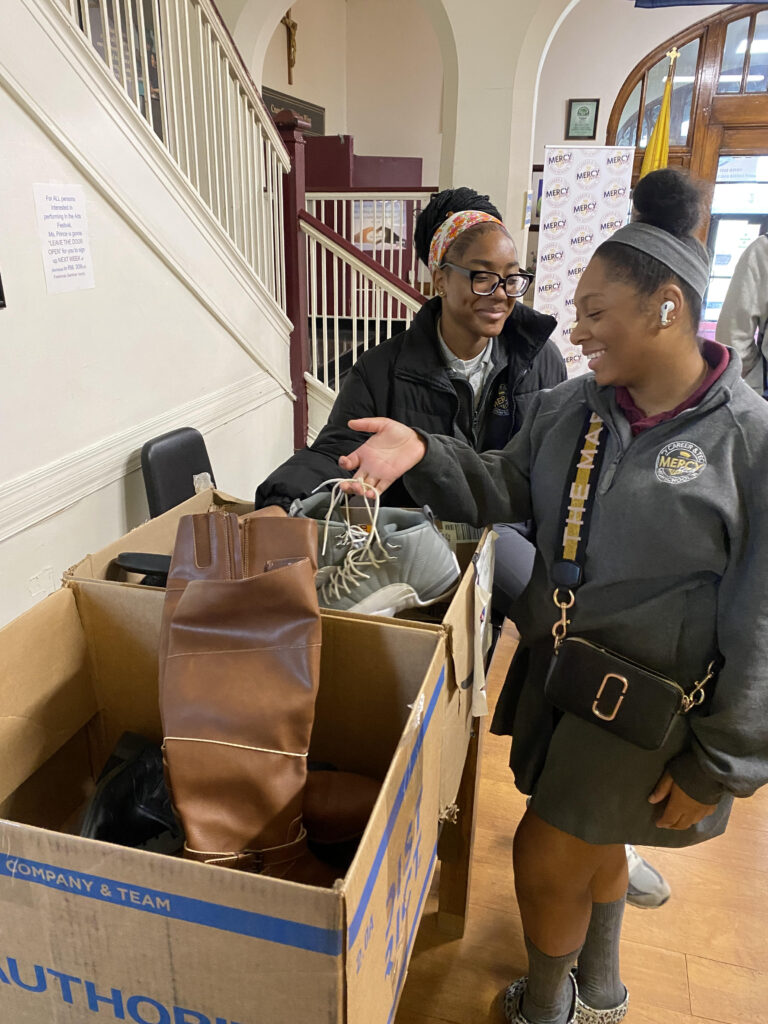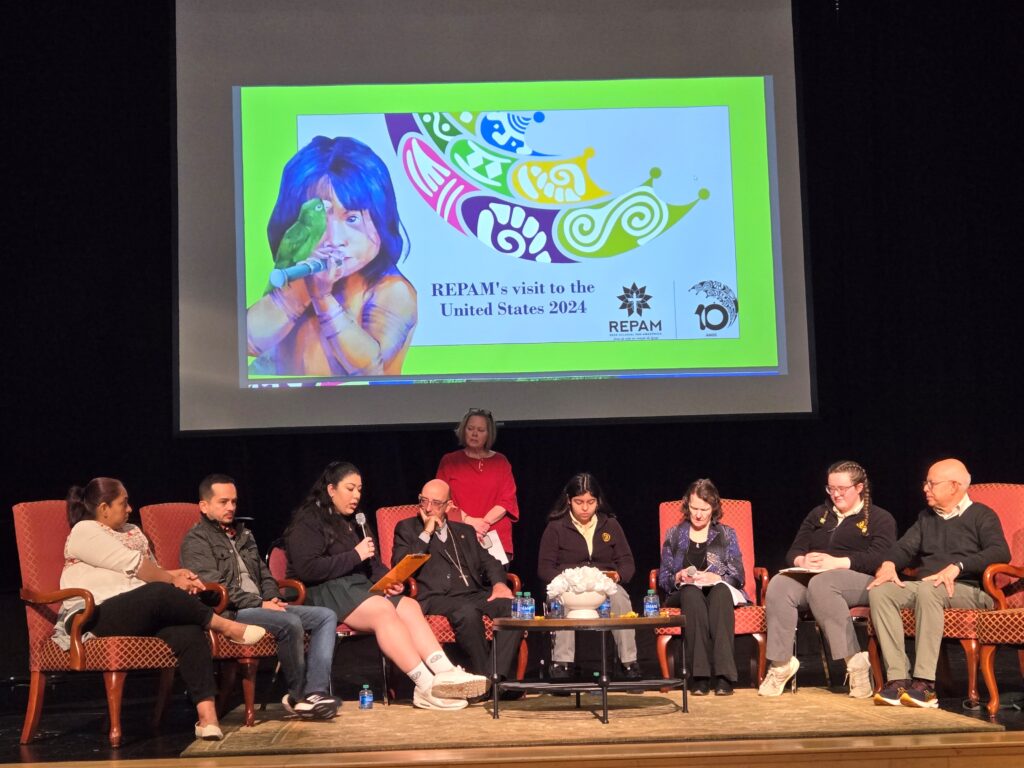July 2025
Articles from Mercy:
- Critical Considerations: What’s at stake in Israel’s destruction of Gaza? (Karen Donahue, RSM)
- Have you heard of Black August? (Br Ryan W Roberts, OLF; Institute Justice Team)
- DEI—Diversity, Equity, and Inclusion (Joanne Lappetito, RSM)
- Featured Reflection: Mercy Life Gathering in Panama (Mary Oladimeji, RSM)
Local Justice News & Upcoming Mercy Events:
Justice Resources & Links
Critical Considerations
What’s at stake in Israel’s destruction of Gaza?
Karen Donahue, RSM
While Israel’s destruction of Gaza and its wider wars in the Middle East / SWANA* continue to dominate the news, a recent article in the Guardian, a British newspaper, looks at the damage this war is doing to the international order that emerged after World War II. Award-winning author Moustafa Bayoumi said that Israel’s war in Gaza “is chipping away at so much of what we – in the United States but also internationally – had agreed upon as acceptable, from the rules governing our freedom of speech to the very laws of armed conflict.
Bayoumi notes that the West’s indifference to Israel’s attack on hospitals, civilian infrastructure, and the use of starvation as a weapon of war are a direct challenge to the ideals set forth in the UN Charter and the Universal Declaration of Human Rights. It sets a dangerous precedent as the public comes to accept this level of violence as normal and paves the way for even greater violence in future wars.
Bayoumi also reflects on how powerful nations manipulate international law to serve their own interests. “For them, the law exists to bend to their will, to destroy their adversaries, and to provide an alibi for behavior which, in a better version of our world, would be punished as criminal.”
Israel’s destruction of Gaza also has domestic ramifications. Action in support of justice for Palestine has been met with unprecedented crackdowns, especially on college and university campuses. Freedom of speech and assembly are sacrificed as criticism of the policies of the State of Israel is criminalized. However, Bayoumi observes that “if there’s a glimmer of hope in all this rage-inducing misery, it can be found in the growing number of people around the world who refuse to be intimidated into silence.”
Note: this is a lengthy article but well worth a read.
* SWANA: Southwest Asia—North Africa
Have you heard of Black August?
Br Ryan W Roberts, OLF; Institute Justice Team
I would venture to say that most people in the United States know about Black History Month in February, a time to remember the accomplishments of people of African descent. There is another month of the year when the focus is more on the struggle for liberation: Black August.
Black August began as a commemoration in prisons across California in the 1970s in recognition of Black resistance to oppression. The founders wanted to honor political prisoners and the many historical milestones in the movement to overcome the colonization of Black lives. From Emmitt Till’s lynching to Nelson Mandela’s arrest, from the March on Washington to the prison killings of members of the Black power movement—especially the assassination of George Jackson—the month of August has marked many potent moments in the history of the African diaspora’s resistance to white supremacy. All the way back in 1619, August marked the arrival of the first enslaved Africans in Jamestown, Virginia. More recently, in 2018, thousands of people imprisoned by the United States organized a prison strike, including work stoppages and hunger strikes. Remember that the 13th Amendment of the U.S. Constitution permits enslavement and forced labor as punishment for crime, a practice liberally used by our prison system to this day.
While some of the events commemorated in Black August used violence to pursue equality and freedom, the Mercy community can honor the Black struggle for liberation by pursuing anti-racist endeavors in the nonviolence at the heart of Catherine McAuley’s work and vision. Black August lifts up the values of education, self-reflection, self-determination, and community service. Fasting and abstaining from some activities honors the sacrifices of those who have lost life or freedom for the cause. Our faith can exhort us to follow the lead of those who disrupt systems of oppression that surveil, police, criminalize, and incarcerate people in unjust ways.
This Black August, I’ll be learning more about how this struggle has been carried so I can learn my place in what comes next. I invite you to do the same. A number of articles can better elucidate by offering several perspectives on the history and continuing observance of Black August:
- • CNN’s 2020 article
- • Wikipedia’s article, including a list of August commemorations
- • Forbes’s 2023 article
- • Black-August.com: Origins and Principles
- • The Hill’s 2020 article
- • Center for Constitutional Rights 2021 article
- • Liberation School: Study, Fast, Train, Fight
DEI—Diversity, Equity, and Inclusion
Joanne Lappetito, RSM
Grouping together the concepts of diversity, equity, and inclusion (DEI) has its origins in the Civil Rights Movement. The Civil Rights Movement was a nonviolent struggle for social justice that took place mainly during the 1950s and 60s for Black Americans to gain equal rights under the law. Persons who currently are 60, 70, or 80 years of age may be able to recall from personal memory some critical moments in the movement: in 1955, Rosa Parks’s refusal to give up her bus seat to a white man sparked the Montgomery Bus Boycott; in 1963, U.S. marshals protected James Meredith as he entered the University of Mississippi as the first Black student; many people can remember the Rev. Dr. Martin Luther King, Jr.’s speech, I Have a Dream, delivered in August 1963 to an overflowing crowd of spectators on the National Mall in Washington, D.C.
Historically, the women’s movement has played a role in the development of DEI, too. The women’s movement had two early historical phases. The first wave of the women’s movement during the 18th and 19th centuries focused on legal rights for women, especially the right to vote. During the 1960s and 70s, the second wave of the women’s movement emphasized equal rights, equal opportunities, and greater freedom in every aspect of women’s lives. The current wave of the women’s movement continues the struggle for equal pay for equal work.
Another more recent aspect in the development of DEI is support for people with disabilities, ensuring that they have rights important to their general welfare. These rights are meant to ensure equal access and opportunity in the various aspects of a disabled person’s life, especially in employment, public accommodation, transportation, and housing. For instance, discrimination in hiring, promotion, and other employment practices is prohibited by law by the Americans with Disabilities Act of 1990. Another hard-won victory is the accessibility of public places, such as department stores or restaurants. Accessibility is also important in housing and in various forms of transportation.
The foregoing historical accounts are brief, but they demonstrate the struggles that brought forth cultural, economic, political, and social changes over time in our American way of life. Many of these changes have been protected by laws enacted by several different Congresses over time. Although the gains made by people of color, women, and people with disabilities have become familiar, everyday practices, these same groups of people say there is still much work to be done.
Today, many corporations, businesses, and institutions of higher learning have adopted DEI as a policy that promotes the fair treatment and full participation of all people in their workplaces or schools. Human resource departments and university recruitment offices work to ensure that the variety of attributes making up human nature are well represented. It is an attempt to make sure that different races, national origins, genders, sexual orientations, ages, religions, and cultural backgrounds are represented in the workforce or student body. The presence of differences within such groups generates creativity and innovation. Diversity also has been proven to be good for business. When clients or customers see someone like themselves working in various enterprises, they generally believe their needs will be better understood. Diversity in higher education simply enriches the learning environment.
The meaning of equity within the context of DEI focuses on fairness, especially with regard to opportunity and access to resources. The point is to provide necessary supports that position employees and students on level ground for success. However, fairness is not the same as equality. Equality impartially provides opportunity and resources in the exact same, measured way for each person. Fairness acknowledges that all people are not the same and have different needs. Accordingly, fairness seeks to address and overcome biases and barriers that have historically disadvantaged groups of people, that is, racial minorities, women, and persons with disabilities. This may mean providing resources and assistance unequally to overcome historical disadvantages to ensure a measure of success.
Inclusion, obviously and simply stated, embraces all, leaving no one out. It eliminates discrimination. Stated positively, inclusion aims to create a workplace or student environment where each person feels respected and has a sense of belonging. Such an environment is empowering and enables people to thrive and achieve a measure of success.
However, in recent years, there has been a backlash against DEI. DEI policies have been criticized and have become divisive as well as a source of political conflict in our country. There are many reasons for this. One major criticism falsely claims DEI is used as a quota system and is not based on merit. Some critics simply call it another affirmative action program. Most importantly, the interpretation of equity in opposition to equality within the context of DEI is a challenging concept; it is a very difficult principle for a large percentage of our population to accept.
Perhaps at the heart of these challenges is the status of white men. Up until the 60s and 70s, white men oversaw every aspect of American economic, social, religious, and cultural life. With the emergence of the new civil and social movements, white men lost some positions. Young, white men no longer could take for granted access to management positions; they found themselves in competition with racial minorities and women. It became unsettling for many white people.
Donald Trump, armed with the tenets of Project 2025, embraced the criticisms of DEI, and, through executive orders, upended federal laws and agencies related to DEI on his first day in office. He threatened corporations and businesses that had DEI policies. Some corporations and businesses capitulated to the administration. Some substantial corporations – Apple, Bank of America, and Microsoft, for example – ignored the president. Others are under constant threat. Some of the best American universities are under a cloud of uncertainty. The full weight of the federal government has challenged the universities by withholding grant monies, levying fines, or providing little opportunity for reasonable discussion. Fear, uncertainty, and chaos permeate the social and economic environment.
Any attempt to eradicate or diminish DEI is a moral issue. The Catholic social tradition offers a clear ethical response for why DEI warrants support. At the core of the tradition’s response is respect for the dignity of each person. Respect for human dignity is a foundational principle and normative value rooted in the belief that the human person is created in the image and likeness of God. Because human dignity is reflective of God, the essence of human nature transcends race, gender, national origin, age, sexual orientation, religion, and cultural backgrounds. Every person has worth. Human dignity’s position as a normative value means that the worth of human beings is the standard by which political, legal, and social institutions are to be evaluated. All human constructs need to be created to support and promote human well-being. The struggle to gain basic rights for a person is rooted in the meaning of human dignity as a foundational and normative principle simply because basic rights and benefits are needed to live a dignified life. The principle, human dignity, is embedded in the meaning, purpose, and value of DEI policies and warrant our support.
The Catholic social tradition’s development of distributive justice is also supportive of DEI policies. Distributive justice is familiarly understood as rendering everyone their due. But satisfying the claim of one person or group is often in conflict with the claims of others. Distributive justice is the standard used by the tradition to sort out the claims of individuals or groups to participate in and access public goods and services. Examples of public goods or services are education, the economy, and health care. Public goods do not belong to any one person but are used by all.
The first step in applying distributive justice to conflicting claims is to protect and promote the dignity of everyone involved. The application of justice also involves an analysis of what prevents access and participation in public goods. What biases or barriers to access need to be removed? Lastly, the consideration of the needs of each person or group becomes a determining factor in achieving a reasoned, fair, and balanced outcome in settling conflicting claims. While these steps are just a brief description of distributive justice, it’s the thinking undergirding DEI policies and the process used by many human resource departments to settle conflict.
A concrete situation may help in understanding how distributive justice is applied. For example, three people work in an office; one of the three people has a back problem. The person with the bad back receives the ergonomically structured chair if the office manager has only one. However, when the stakes are higher, as in many conflicts related to public goods, the just outcome is often not perceived as reasoned.
What does all this mean for the Sisters of Mercy? First and foremost, we need to review the policies that direct our recruitment, hiring, and promotion processes throughout all our ministries. Whether or not they are named DEI, we need to ensure that the values embedded in DEI are reflected in our policies. It’s important that our employees and students feel valued, are comfortable enjoying a sense of belonging, and are able to grow as persons in the environments we create. This is not to say this is not happening. It is a reminder to celebrate our successes and to seek improvements. Support of DEI values begins with ourselves.
Our Critical Concerns of Racism, Immigration, and Women place us squarely in the midst of the DEI backlash. Acknowledging that we are an aging religious community, it is unlikely that many of our sisters will participate in protests or sit-ins. Our prayers are essential. But with regard to prayer, St. James, in his epistle, reminds us that prayer is accompanied by good works. Perhaps the accompanying good work for the sisters who are able is committing to learn more about DEI, its current national landscape, and how the various nuances affect our Critical Concerns.
Letter writing is another good work. The bishops, taking their lead from Pope Leo, are becoming more involved, especially with regard to immigration. We need to write them to thank and encourage them. Writing our members of Congress is a longstanding Mercy effort as well.
Our forefathers were wise men and had great foresight when they wrote in the Declaration of Independence: “We hold these truths to be self-evident, that all men are created equal, that they are endowed by their Creator with certain inalienable rights, that among these are Life, Liberty, and the Pursuit of Happiness”. This declaration also represents an unfinished goal that we can work toward fulfilling.
Featured Reflection
Mercy Life Gathering in Panama
January 13–16, 2025
Mary Oladimeji, RSM
Introduction
Looking back on my Panama experience, here are some of the blessings, surprises, lessons, and insights that I wish to share in our ongoing call toward reimagining and renewal of Mercy into the future.
Arrival
My journey from Nigeria took over four days. I found myself stranded in the middle of the night on arrival. The mercy of God came to my rescue in the person of a Black woman taxi driver. As the airport emptied out, she asked me for the tenth time if I needed a taxi, and I continued to assure her that I didn’t need a taxi. I was being extra cautious about taking a taxi, given the information sent out to alert us to opportunistic crimes targeting unsuspecting tourists. The exchanges continued with her few words of English and my even fewer words of Spanish. She assured me that she could get me to my destination if I had the address. It was over two hours of waiting by this time. The lady came over again. After saying an inward prayer of trust to the universe and my ancestors, I showed the address to her reluctantly. First, she drove me to terminal 1 to find out if any of the last arrivals in our group might still be there. But terminal 1 had already emptied out and closed; it was after 10 p.m. She typed the address into Google Maps, and we made our way in silence through dark streets. “Lord Jesus, son of the living God, have mercy on me.”
People familiar with unreliable systems can understand and appreciate the important role of prayer and trust in the universe. Where appealing to political systems for recourse often fails to provide protection and redress, unseen forces are the last hope of those without power.
When we arrived at Mira Flores retreat center, the first person I saw through the window was Sr. Deborah Watson! I breathed a sigh of relief. A man approached the taxi and asked: “Sr. Mary?” All was well!
Visits to Ministries
The next morning, I was surprised by a feeling of unexplainable energy despite the expectation of tiredness from the journey.
Sisters from the States visited two ministry sites in Colon. The first ministry was located in the heart of one of the poorest neighborhoods, in the oldest parts of the city, while the other ministry was in a lower-middle-class area.
We were serenaded with music and cultural dances performed by some of the children and a past student of the center. Two sisters and a lady who is a beneficiary of the center shared about their work among Indigenous women, while another lady and her daughter and granddaughter shared about the financial benefits to all three generations of skills learned at the center. Sharing the experience of our visit the next day, we described our Panamanian sisters as: “makers of joy”, “defenders of joy”, “guardians of joy”, “bearers of joy”, etc. The sisters and the people they serve gave concrete expression to the joy that we experienced.
Opening Ritual: We are one: Membership and Care
Sisters processed in with the four elements – earth (sand), fire (lighted candle), water (the free-flowing water calls us to inhabit nonviolence), and wind (a dancer waving a piece of cloth) – and banners depicting our Critical Concerns.
A letter from Catherine was read to the gathering. The phrase that stayed with me from the letter was: “…entrust Mercy to you with hope…”
In her introduction to the work of the gathering, the animator engaged us in some activities that were meant to facilitate the shift that is required for us to embody an identity of belonging and care.
There’s a need both to learn and to unlearn. For example, integrating Western rational intelligence with the body intelligence that characterizes most of Indigenous knowing. A process of unlearning requires a conscious shift. A reference was made to Pope Francis’s analogy about how to harmonize the three languages of head, heart, and hands.
The group was engaged in a whistling exercise to show that harmony and integration are required to achieve a common “language”, to become one with the group. Reading from right to left and reading with head turned sideways… this can change meaning, one’s outlook, and even how one responds.
The third exercise involved two sisters sharing an embrace. To embrace the other requires firmness, flexibility, and openness all at once. An embrace can turn violent if we deny the other the opportunity to inhabit their space.
For me, the theme of belonging and care was made concrete in remembering myself being stranded on arrival. First, I called my SLM. Then, I called the IM in my area. I also sent messages to other sisters who could help contact some of our Panamanian sisters. The sisters I contacted demonstrated their care and concern by contacting other sisters who could assist me in the moment.
To demonstrate the mutuality required for individual sisters to have a sense of belonging, a picture was shown depicting how tree roots are intertwined below the ground. It illustrated a relationship of mutual care among species of different trees in the ecosystem. It is as though the roots of the trees are “holding hands”.
The imagery of trees belonging to and caring for each other in their different areas of need and stages of development is the ecological relationship which we are called to embody, while moving away from systems that emphasize the ego. The ecological system is cyclical, communal, and characterized by mutuality and transparency. The ego-system is top down and focuses on self, with one or a few having all the authority, power, and information.
We went into groups to reflect on the question: How do we keep our relationship more ecological than ego-logical from a care perspective?
A panel was asked to reflect on signs that generate life and provide clues for other possible systems. A second panel was asked to reflect on their experience of migration, while a third panel was asked to reflect on health and care. Following reflections by the panelists, we returned to our groups to reflect on the questions:
• What does justice mean to me?
• What do we need so that our works of mercy can continue to be a contribution to the work of justice this time in history?
• What practical actions can we engage in as Sisters of Mercy?
For me, there are many analogies in this experience that lend themselves to our desire for solutions to mounting challenges confronting us as the Mercy community and as citizens of our countries and the world.
I first encountered the story about the Panama Canal in one of the stories in my English language textbook under reading and comprehension exercises. Not too long ago, I saw a PBS documentary about the life of President Theodore Roosevelt and his involvement in building the Panama Canal. The mental picture that I had reading the story as a child growing up in Nigeria was awe-inspiring, and seeing historical footage of the making of the Panama Canal left me even more spellbound. Before our arrival in Panama, we were asked to indicate one site out of the three tourist attractions that we wished to visit. I had no conflict. The Panama Canal was it, and I was not disappointed. The Canal was closed for operations on the day of our visit. Instead, we viewed a historical documentary movie. The 3D glasses made the viewing experience so real and up close, it felt as though I was a part of the happenings.
What Practical Actions can we engage in as Sisters of Mercy?
The incidence of the first bomb blast in 2011 in Nigeria set me on a journey of conscious embrace of nonviolence and commitment to teaching its basic principles to the next generation (children and young religious women). Ministering in Nigeria has tested the limit of my commitment to nonviolence almost daily. My experience has served to strengthen my commitment and belief in nonviolent activism as an effective tool in quiet revolution. I’m especially committed to the revolution of awakening of the consciousness of a person committed to wrongdoings, whose values of common decency and respect for the dignity of the other are skewed so much that sometimes I am tempted to respond in kind.
The call to move from ego to eco is a call to return to simplicity and a return to the basics. Science and technology have promised to make life easier, and they have in many ways. But complications and irreversible damage to humans and nature have also resulted. The promises of science and technological development have not brought blessings and gains to the majority of the world. Those whose lands and labors enrich other lands and peoples live in abject poverty, driven from their land, becoming unwanted and hunted refugees, robbed of their rights to dream and hope.
What Does Justice Mean to me?
As I work on this reflection, the breaking news about fresh attacks on the people of Congo aired. Around the same time, Palestinian refugees were making their way back to Gaza. Most of the Western world has grown used to seeing masses of Black and brown bodies fleeing their homelands. Black and brown bodies have continued to be collateral damage in the West’s insatiable appetite for precious metals, minerals, arable land, waterfronts, and ocean-view real estate, and especially by the belief that one race or class of people has a divine right to profit at the expense of Indigenous populations, whatever it takes (slavery, genocide, the use of religions to keep people pliable for subjugation and grand scale dispossession of their birthrights, and uneven economic playing field). We are complicit. The Church has done a lot of good in the areas of education, poverty alleviation, and health care. Even these good deeds have left generational trauma in people. The Church has learned little lessons from past mistakes borne of ignorance and the erroneous belief in racial superiority, as well as a corresponding belief in the superiority of Western systems (education, politics, commerce, religion, medicine, etc.).
My people have a saying: “Oyinbo to se pensu naa lo se iresa.” Simply put, “The West is the antidote to its poison”. While Christianity has done a great many good works in Africa, the impact of wrongdoings has lasted generations. The contact of the West with Indigenous peoples resulted in the destruction of values and the destruction of far more sophisticated systems of government, political systems, commerce, and social cohesion. The belief in the sacredness of all things because the Sacred Spirit inhabits all things is not a belief that has not been particularly emphasized in Christianity until very recently. Even though Vatican II expressed the recognition that missionaries did not bring God to the Indigenous peoples, but that God was already present, known, and worshipped, the attitude of adherents of the three Abrahamic religions says differently. The Yoruba people of southwest Nigeria are said to be the most tolerant of other beliefs and welcoming toward other ethnicities. Because of their value of hospitality, Christianity and Islam thrive in the region. Yet fundamental Islam and Christianity have continued to attack and call for total annihilation of Indigenous beliefs and systems of worship.
The imposition of foreign systems has continued in shifting guises to this day. When I say that there’s a need to return to the basics, democracy is a good example. Democracy has not succeeded in most parts of the world, most especially in Africa, because built into the system of democracy are mechanisms that make it susceptible to failure. Democracy, as a system of government, was conceived in Greece for people of European descent. Not every nation must practice democracy to ensure fairness, the rule of law, and assurance that all citizens are equal partakers of the commonwealth. When villages and communities were responsible for the welfare of their people, everyone had access to what they needed to live in dignity and security on their own land. The world has become a global village where only the wealthy class and people with sophisticated weapons have unlimited access to the goods of the world. The West insistence on making the governments of the world look and operate the same is simply for the gain and benefit of the West and their domestic collaborators. Developing nations are vilified for corrupt practices and corruption in government, whereas, the same system assures continued dominance of the West and unchecked access to Africa’s minerals and raw materials. It is said that Congo is capable of growing enough food to feed two billion people and possesses fifty percent of the world’s mineral deposits. In other words, Congo is to the world in terms of solid minerals and waterways what the Amazon rainforest is in terms of its ecosystem. To ensure its dominance, the West continues to employ politics of divide and rule, playing one African nation against another (Rwanda and Congo), playing one tribe against another (Tutsi and Hutu).
Another example of western imposition is found in healthcare and pharmaceuticals. Again, Indigenous peoples had their systems of using natural herbs and roots in ways that were respectful and sustainable to treat ailments. The sense of sacredness that inhabits the bodies of water, mountains and hills, leaves and trees – this was demonized at the coming of Western invaders. Today, forests are being destroyed. Hills and mountains are leveled for “development”. Waterways are polluted to access fossil fuels. When people are made sick as a result, they have no access to the lands that once healed them. Instead, they are made to turn to pharmaceutical drugs that are often out of reach. I learned recently from a Yoruba herbalist and shaman that the Yoruba people were already practicing inoculation, while Europe was still engaged in bloodletting as popular method of treating various ailments.
Challenges Calling for Our Merciful Response
As Sisters of Mercy, our commitment in this age will need to include support, encouragement, and advocacy for people to return to systems that had worked for their ancestors while advocating and working for a world where all people can exercise control over their destiny and determine the extent and degree of interaction with the rest of the world.
Intercultural and Global Reality and its Implication for Mercy Witness
Recently, I called the attention of our Justice Team to the news about the former U.S. Secretary of State ordering the shutting down of online news outlets operated by young Africans (during the General Assembly of the UN), under the pretext of sponsorship by Russia. We found out from the operators of the news outlets affected that the real reason behind the shutdown was that young generations of Africans are asking uncomfortable questions about Western involvement and continued economic and political disparity perpetrated by the West, and they are showing proof that is difficult to dismiss or deny.
How can we claim to live up to our intercultural and international reality if we concern ourselves narrowly to the U.S. (including its territories) and countries within our Institute because other countries are “outside our jurisdiction”? What then is the implication of our international and Catholic identity?
Those of us whose lands were colonized spiritually, culturally, and politically open ourselves whole-heartedly to what we were taught: that we are one, that we are more alike than we are different, that globalization is for the benefit of everyone, yet the reality says differently.
I learned during our visit that Panama has adopted the U.S. dollar for the most part, yet a liter of gas costs $8 in Panama, while it is about $4 in the U.S.
Fr. Bryan Massingale called religious women at the LCWR conference in 2024 to model needed lamentation so we can live up to our prophetic identity. Lament must also move us to courageous reimagining. United States women religious responded to the call of Vatican II. Why was it “easier” then than the kind of reimagining and re-visioning that is required of us at this time? Why do many of our sisters impacted by racial hegemony continue to feel that implementation of our call to be more embracing of interculturality and internationality is still so tentative? Why do our processes continue to marginalize minority voices and worldviews and experiences? Why is the next generation of Mercy not the dominant voice in our succession plan? What does mentorship look like in the Mercy tradition? How is the next generation being mentored, prepared, and given freedom to shape the future of Mercy? Who are those being mentored currently? Why are we not open to experiences that stretch us and challenge us to move beyond our comfort zone? These are some of the questions that my Panama experience and leadership discernment process have brought up for me.
The analogy of the Panama Canal: the human ingenuity that conceived and brought about a technological wonder that is of benefit to the world is also capable of ending wars, hunger, genocides, and profits at the expense of the poor. Unfortunately, history has demonstrated that the West will be interested in righting wrongs only if there’s something to gain. COVID-19 exposed the hypocrisy of the West. The moment it was clear that most deaths were being recorded in the northern hemisphere than in the global south, a vaccine suddenly appeared. Even then, it was not made available to Africa at the same time. There were reports of expired vaccines being sent to some countries.
In this time and age, living up to our prophetic calling as Sisters of Mercy would require that we admit our complacency, admit that we have benefitted from the systems that oppress others around the world, learn to lament, model lamentation for our society to follow, and take concrete steps within our own community to make our words match our deeds. As Yoruba people say, “Eni ti yio da aso ro ni, ti orun e ni a koko wo” (“If someone offers to buy you a garment, you must first look at what she has on”). Put differently, you cannot give what you don’t have.
Challenges calling for our Merciful response
Sisters call for an interrogation of some of our current practices…
- • The Eucharist/reposition of the real presence of Christ (bread), church buildings as holy places to the exclusion of all creation, separation of Christ and the Creator from creation perpetuates continued disregard of the sacredness of nature and treatment of the human person as disposable.
- • Rising mass migration of peoples: a call to imagine a new system that benefits all.
- • Embodying and mentoring active hope: to be built every day, to challenge the attitude of waiting for “manna from heaven”.
- • Be in the forefront of the formation of a critical mass of humanity that will assert the belief in the value of human life and the cosmos above money and profit.
- • Support groups and organizations who are upholding hope, e.g., assertion of the Supreme Court of Panama that development and protection of the environment are both integral to achievement of fulfilled human life
- • Attitude and policies in Church and society that continue to uphold Euro-centric, colonial and imperial legacies of the status of women as second-class citizens (European, colonial, and imperial legacies, as distinct from some Indigenous cultural practices where women were citizens and had equal rights). A call during our last General Chapter to incorporate more words upholding “women” in our documents.
- • Genderless language: most Indigenous African languages are genderless. God has no gender either. The Yoruba system promotes an egalitarian society where everybody’s wellbeing is seen as necessary to the communal wellbeing.
- • Works of Mercy are works of justice: Mercy needs to go beyond actions of kindness.
In closing, I am grateful for the opportunity because the experience reawakened some latent skills. I didn’t realize that I knew many Spanish words. I found myself able to catch and make meaning during the processes. In addition, my knowledge of French also helped. I recommend opportunities that challenge us to grow and walk in the shoes of another, so that we grow in respect and understand at a deeper level what others who do not speak our language have to go through for integration and acceptance. I was grateful that the English speakers were the ones who had to make extra effort to understand the processes.
For further reflection and wisdom inherent in the Indigenous systems, which can help us respond to the invitation of great reimagining, see Victoria Loorz and Valerie Luna’s contribution in The Earth Story published by Center for Action and Contemplation (Thursday, February 20, 2025).
Article Archive
2025
July
Critical Considerations:
What’s at stake in Israel’s destruction of Gaza?
Have you heard of Black August?
DEI—Diversity, Equity, and Inclusion
Mercy Life Gathering in Panama
June
Vampires, Sharecropping, and the Real History of Juneteenth
Protecting Children and Vulnerable Adults from Abuse in the Philippines
Critical Considerations:
What’s really driving border enforcement?
May
Critical Considerations:
April
Critical Considerations:
Water extractivism in Palestine
March
Critical Considerations:
Who benefits from tax cuts? Who pays?
NETWORK webinar on U.S. federal policy
February
National declaration of emergency in Bajo Aguán
Critical Considerations:
Has the United States declared war on immigrants?
January
If you make a mess, clean it up! (Advocacy success in NY)
Youth claim climate victory in Montana court
Critical Considerations:
(click years to expand)
2024
December
Critical Considerations:
Is the United States becoming a plutocracy?
November
Critical Considerations:
What happened on November 5, 2024?
October
Overturning the Chevron deference
Critical Considerations:
Who are the Israeli settlers and what motivates them?
Assassination of Honduran water protector deeply grieves Sisters of Mercy
September
God walks with his people: National Migration Week September 23–29
Critical Considerations:
What does CEO compensation say about corporate priorities?
Anxiety – election season can heighten it!
August
Critical Considerations:
What is Project 2025 all about?
Working to stop weapon exports to Haiti
Participating in Elections, part 2
July
Critical Considerations:
Is there a better way to spend $91 billion?
Education, Agriculture, & Emigration in the Philippines
Participating in Elections, part 1
June
Critical Considerations:
Are we creating a prison-industrial complex?
Mercy student videos address the Critical Concerns
May
Critical Considerations:
Degrowth is the only sane survival plan
Argentina and the government of hate
Listening to a chorus of voices
April
Critical Considerations:
An Israeli Jesuit reflects on war in the Holy Land
Advocacy Success! Expanded Background Checks for Gun Sales
March
Military spending and national (in)security
February
The challenge Gaza war presents for American Jews
January
Gaza war threatens credibility of West’s commitment to human rights and the rule of law
2023
December
Climate Summit fails to adequately respond to gravity of climate crisis
November
Critical Considerations:
The dangers of conflating Anti-Zionism and Antisemitism
Red flag laws in jeopardy: faith voices speak to save them
October
Jewish and Palestinian perspectives on Gaza crisis
September
U.S. China tensions impact efforts to address climate change
August
When Good Economic Policy Isn’t Enough
July
States Move to Weaken Protections for Child Workers
June
Corporate Lobbyists at Climate Talks
May
Electric Vehicle Transition Challenges
April
Repudiating the Doctrine of Discovery
March
February
The Rise of Christian Nationalism
January
2022
December
How Corporations Took Over the Government
November
The Independent State Legislature Theory Explained
October
Local Justice News & Upcoming Events
Check back soon!
Justice Resources & Links
Mercy Justice Resource Pages
- Resources for Immigrants
- Advocacy Amplified! (Mercy Justice Videos on advocacy tools)
- Mercy Walks with Migrants (interviews with Mercy sisters on immigration work)
- Mercy Tips to Care for the Earth

